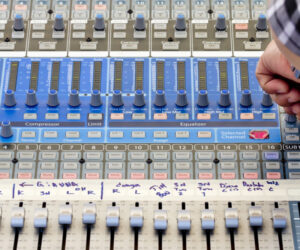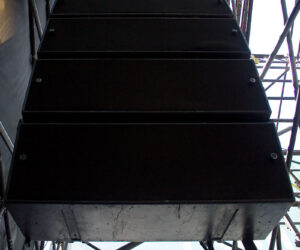I got a call last night from a buddy of mine, the technical director of the 700-seat theatrical space at an area college. The college was bringing in a national tour of stand-up comedians, and shortly before the show, the tour’s tech person handed my friend an iPhone running the Spotify app, and explained that all the musical cues for the show were on a Spotify playlist.
Their plan was to connect the phone to the campus’s student WiFi network and stream the show tracks in real time. My friend told the tour manager that this seemed like a bad idea, and got the response, “It’s worked great so far.”
The phone’s battery was low, and it was one of the new models with only a single port so it couldn’t be connected to both power and the audio console at the same time. As a result, the phone was alternated between the charger and the DI throughout the show, with frequent breaks for the phone’s owner to text with his girlfriend.
I don’t need to point out all the problems here…
Suffice it to say, my friend was forced to spend the entire event worrying about the phone situation in a way that prevented him from giving his full attention to all of the other aspects of the event as well. And, of course, the audio stream failed when the house opened, hundreds of students poured in, and the campus network slowed to a crawl.
Now, this is not a dig at streaming music services or any phone manufacturer, nor is it a consideration of what sort of tools can meet the must-work-every-night-without-flaws standard of professional production. (Personally, I’m extremely reticent to accept any smartphone as a show-critical piece of playback equipment, and then only when it’s on airplane mode, but that’s beside the point.)
No, this is about us – the human beings responsible for the interactions and decisions that bring every event to life. How is it that, out of all the stops on a national tour, my friend was the only production professional who thought to mention that streaming show tracks from a web service via a campus WiFi router simultaneously being used by 700 other people was not the best plan?
A large part of our job in event production is to rely on our skills and experience to be proactive when it comes to recognizing factors that could potentially disrupt or derail the performance – whether from a technical or safety perspective – and deal with those things before they become issues in the first place.
It’s not our jobs to give the clients everything they want, but rather to interpret their wishes and goals into technically and safely realizable plans.
This includes everything from recommending a different vocal microphone after seeing how a vocalist handles a mic to not allowing theatrical sets to block the fire curtain line, and everything in between. It’s the production industry’s version of “If you see something, say something.”
Ultimately we’ve been hired to make the event happen successfully, and it’s a fair bet that we know more about staging successful events than our clients – that’s why they hired us. If I think a decision or course of action decided upon by a client could be problematic for the show, I’m going to discuss it with them. That’s what we’re being paid for; if clients were production experts, they wouldn’t need to hire us, now would they?
This goes hand in hand with diplomacy and professionalism.
Of course, if we’re polite and professional, our clients are more likely to be receptive to our input, but it runs deeper. Growing up, I worked with the local production company for over a decade. We were small, and couldn’t compete with the larger regional companies on inventory or prices, but we were consistently kind, courteous, respectful, and competent. We’d show up, look presentable, be nice to people, and do the best job we could.
The one bit of feedback we routinely heard from clients? “You’re the best company we’ve ever worked with.”
This is shocking – what were we doing so much better than everyone else? Honestly, the answer to that question should be “nothing.” Being basically competent and respectful should not set anyone at the top of the field – it should be the minimum expectation for our industry.
I look forward to the day when every technician at every tour stop will tell that comedy tour manager that streaming live tracks during the show is a bad idea, and will do it with decency.













